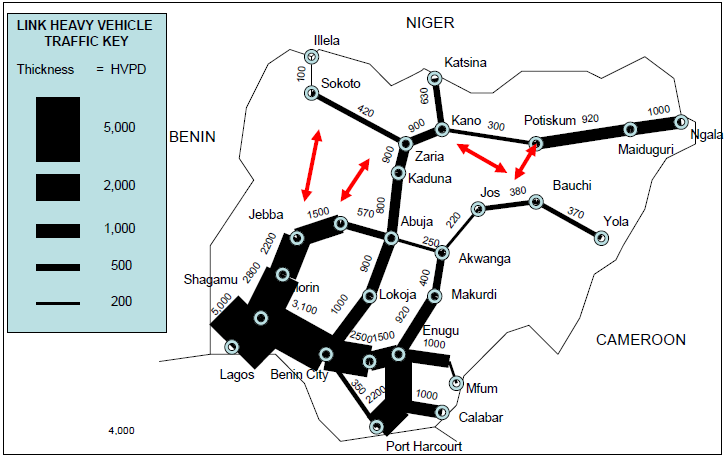Introduction: An extract from the presentation of the Green Paper on National Tolling Policy on Roads & Bridges: The alignment process became pertinent in order to eliminate all and every duplicity and or complications in Policy guidelines for the development and maintenance of the road infrastructure in Nigeria.
1. Policy must take care of both Public and Private Finance roads Private investors shall be encouraged to consider investing in Build Operate and Transfer (BOT) models and other such variants suitable for the provision of new construction in the road sector while maintenance concessions shall remain in the purview of the public sector.
2. Only economically viable roads shall be subject to tolling Economic and financial viability shall be a major consideration for embarking on toll roads in Nigeria. Inasmuch as there cannot be an outright shirking of socio-political considerations in the development of road infrastructure in Nigeria
3. Tolling shall be completely cashless and be through electronic methods Tolls shall be collected through suitable electronic means that eliminates direct human interfaces at toll plazas. Magnetic cards, chips e.t.c; becomes pertinent to collection of tolls while the use of cash is out rightly discouraged if not barred.
4. Monies accrued shall be ring-fenced for dedicated maintenance of respective candidate roads Accruals shall be ring-fenced and dedicated to the maintenance of individual candidate road being tolled.
5. Tolling shall not commence on Public tolls unless candidate roads are certified appropriate for tolling Existing roads can only be tolled by government through the Federal Ministry of Works or is assignees and this shall not be carried out unless such qualifying roads are deemed in good state to provide good, safe and smooth rides.
6. Toll plazas and tolling equipments shall be standardized for ease of maintenance Considring the fact of the existence of varieties of tolling solutions, it is imperative to standardize the applications of tolling solution nationwide to promote the development of suitable maintenance regime.
7. Toll plazas shall pass national security considerations Locations of toll plazas shall be such that their existence provides ample security nationwide. The use of AVI; ANPR and RFID e.t.c Toll Plazas shall consist of dedicated platoons of the Nigerian Police, NDLEA, and Secrete Service e.t.c
8. Tolling on public financed roads shall not commence unless requisite infrastructure for the collection of tolls is provided. There shall be no tolling on public financed roads unless toll plazas and Electronic Collection Methods (ECM) have been installed, tested and commissioned.
9. Tolls shall be based on engineering traffic studies. No toll shall commence without the conduction of requisite studies including traffic studies, the preparation of Outline Business Case (OBC) & Full Business Case (FBC) and a widespread survey on Willingness to Pay (WTP).
10. Only major projects that result in significant increases in capacity will be subject to tolling. Tolls should only be applied to offset costs for significant investments that primarily expand or extend highway capacity. New roadways, new bridges, and major highway upgrades, such as four-lane dual carriageway highway for a substantial distance, would be subject to tolling. Minor improvements, such as passing lanes, and improvements whose primary purpose is to address safety and reliability concerns, such as realignments, would not be subject to tolling. In some cases, a substantial portion of the cost of a major highway upgrade will be for significant safety and reliability requirements as well as the need to expand or extend highway capacity. In such circumstances, the cost of the safety and reliability improvements may be funded by government, with tolls recovering only the costs related to the increase in capacity.
11. Tolls will be implemented only if there are clear, verifiable net benefits for the users of the new or improved facilities. The benefits generated from new or improved facilities must outweigh the burden imposed by tolls. User benefits can include travel-time savings, vehicle operating cost savings, and reliability and safety benefits.
12. Tolls will be implemented only if a reasonable untolled alternative is available. The public has a right to a basic level of toll-free access. Therefore, tolls will be implemented only if a reasonable untolled alternative is available. Most of the viable highways have alternative routes.
13. The level of tolls and limits on the amount and frequency of increases will be established in advance. In order to provide certainty to the public and partners that tolls will be set at reasonable levels and not subject to unreasonable increases in the future, the level of tolls and limits on the amount and frequency of any future increases will be set in advance.
14. Public consultation will occur in all cases where new tolls are considered. Where improvements to transportation infrastructure will be subject to tolling there must be local input prior to decisions on how tolls are to be implemented. The government will consult on these matters with affected communities.
15. The public will have the same rights to access tolled highways as non-tolled highways. Access to a tolled highway will be the same as to untolled highways. All legal vehicles will have access, except when restrictions are required for public safety or maintenance and construction-related activities. A right of access to tolled highways does not eliminate the obligation of the user to pay the requisite toll.
16. Tolls will be used to generate revenue for transportation projects and provide a return on the investment of the private-sector partners. To minimize costs to the travelling public, tolls will be used to defray the costs of designing, constructing, operating and maintaining rehabilitate/new highways or major highway upgrades.
17. The same maintenance, safety and other standards, and rules of the road, will apply to tolled highways as non-tolled highways. For public confidence, public safety and ease of enforcement, any private-sector partner would have to comply with or exceed the maintenance, safety and other standards that apply or will apply to comparable publicly maintained highways. The same rules of the road will also apply to all highways. Areas in which standards will apply include but are not limited to safety, maintenance, design, signage, enforcement, and operating performance.
18 .The privacy of personal information used to levy and collect tolls will be protected.
- To protect the privacy of the travelling public, a highway operator will only be permitted to collect personal information about users of the highway if the information is: obtained directly from and with the consent of the person; necessary for ensuring safety in relation to the operation of the highway; or, necessary for assessing or collecting tolls or other charges related to use of the highway.
- A highway operator is not to use or disclose personal information about users of a highway unless the use or disclosure is necessary for: ensuring safety in relation to the operation or use of the highway; assessing or collecting tolls and other charges associated with the use of the highway; satisfying a court order; or other uses authorized by legislation.
19.A fair and expeditious process will be available for resolving tolling disputes. Highway operators will be required to use a stipulated process for resolving disputes over toll charges. If agreement is not reached under this process, the dispute will be referred to a third-party arbitration process for resolution. To ensure impartiality, arbitrators will be independent of the highway operator and appointed by the government for a fixed term. The decision of an arbitrator will be final and binding on all parties.
20. The consequences of failing to pay tolls will be fair and reasonable. As with others who invoice clients for services or goods received, highway operators may apply reasonable interest or other charges to late and/or unpaid bills. Examples include charges to recover the increased costs of collection. To ensure interest and other charges are reasonable, the government will have the authority to limit such charges. If substantial amounts remain unpaid after the appeals process has been exhausted, the responsible agency may refuse to renew vehicle or driver licenses until payment is made, such as is the case for outstanding speeding tickets.
Ministerial Work-Group On The Development Of A National Roads And Bridges Tolling Policy For Nigeria




